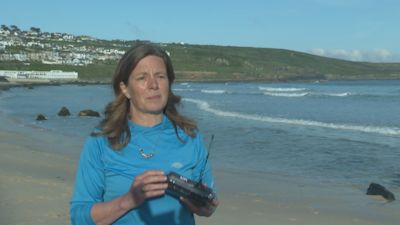The message in a bottle experiment key to understanding plastic in our oceans

Watch Charlotte Gay's report
Plastic bottles with tracking devices have been released off the coast from St Ives to send a message to world leaders to prioritise saving the ocean from pollution.
On World Oceans Day, more than 70 organisations across the globe representing leading scientists and NGOs are calling on G7 leaders to "Listen to the Ocean" as part of their forthcoming discussions during the G7 Summit.
The "Message in a Bottle" campaign is releasing seven bottles, each named after a country in the G7, to see how far they travel around the world as they are launched from various points around the north and south of Cornwall.
Eight million tonnes of plastic enters the ocean every year and campaigners say world leaders are failing to listen to the scientific evidence that urgent action is needed to protect the planet from climate change.
Heather Koldewey is a marine conservation lead at Zoological Society of London and an Honorary Professor at the University of Exeter, she says this is a global problem.
"Everywhere we go, whether it's the deepest part of the ocean or the most uninhabited islands we find plastic pollution. We can to stop plastic getting into the ocean in the first place but by understanding the movements better, we can show the impact and do everything we can to stop plastic going in in the first place," she said.
On releasing the first three bottles on Tuesday 8 June, Heather predicted some are likely to end up between national borders which she says is one of the problems with the global effort to clean our oceans.
"We think the bottles we are going to release off St Ives are going to head north, maybe up the Bristol Channel or they may head further up to the north of Scotland."
Alasdair Davies designed the technology inside the bottles based on the technology previously used to tag and track sea turtles.
"What we do is conserve power put it in a sleep mode, it spends most of its time asleep, it wakes up it waits for a satellite to pass over sends its message and goes back to a quiet mode. It wakes up every three hours so we hope to get about five or six passes every day from the satellites.
"We'll really get a sense of where plastic moves on the open ocean."
The devices in the bottles have a lifespan of up to two years, and the group tracking say they will find ways to retrieve the bottles when they are nearing the end of their battery life.